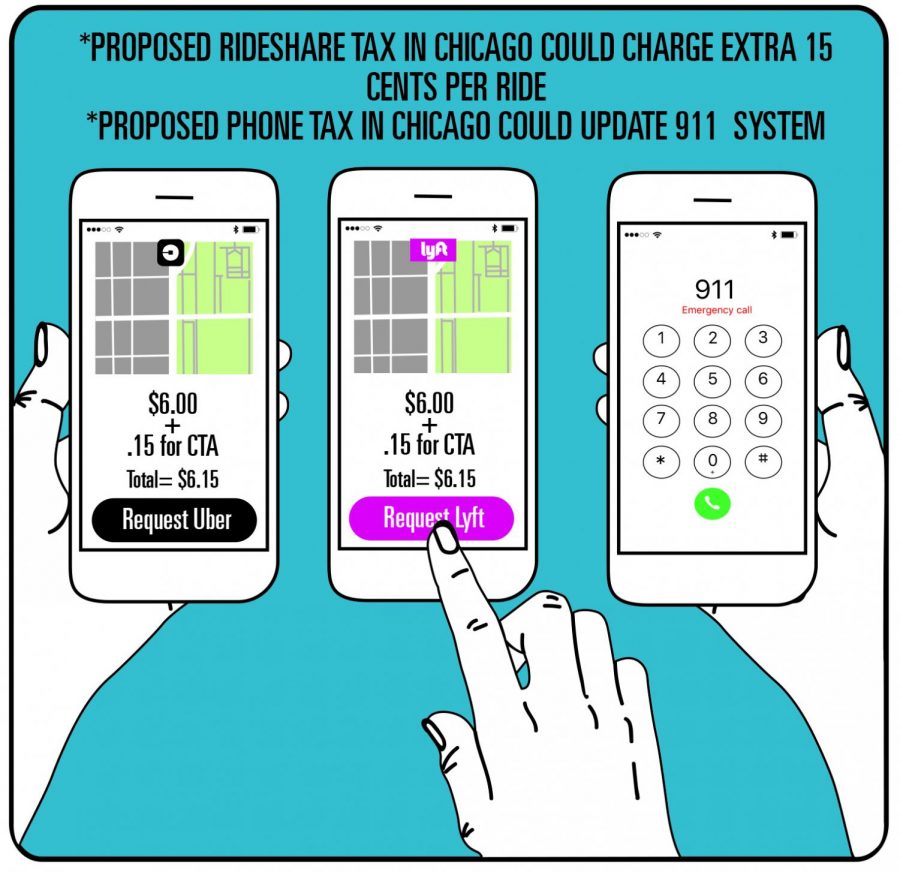Higher taxes called on to drive city improvements
Higher taxes called on to drive city improvements
October 30, 2017
Chicagoans Could soon be seeing increased fees when riding in an Uber or paying their cell phone bill if the mayor has his way.
Mayor Rahm Emanuel’s 2018 budget proposal asks that cell phones and land lines registered to a Chicago area code be billed an additional $1.10 per month—totaling $5 a month per line when added to previous fees—to finance the modernization of the city’s 911 call center.
A 15 cent increase to the existing fee for rideshare services, such as Uber or Lyft, would bring the total fee to 67 cents per ride. Another 5 cents would be added in 2019. The funds generated by these taxes would assist Chicago Transit Authority projects, as reported Oct. 20 by The Chronicle.
The spending proposal is scheduled to be voted on during City Council’s Nov. 8 meeting.
“How many times [does the city] need to come back to taxpayers and rely on [them] to modernize a system,” said Chris Lentino, manager of Chicago Outreach at Illinois Policy—a nonprofit libertarian think tank. “Chicagoans [already] bear one of the highest tax burdens in the country.”
Chicago has the highest U.S. city sales tax and among the highest property taxes in the country, Lentino noted.
The city was not taxing the right avenues for success, but this rideshare tax should be better, said John McCarron, contributing columnist for the Chicago Tribune and adjunct journalism lecturer at DePaul University.
Rideshare services are a relatively new, taxable growth area developing around the city that is “overdue” and could be a more effective practice, rather than just relying on sales or property taxes, according to McCarron.
According to a 2015 survey by Pew Research Center, urban residents are seven times more likely to use rideshare services than people in more rural settings. Additionally, people ages 18–29 are nine percent more likely to use rideshare services than someone in their 30s or 40s.
“[The rideshare tax] doesn’t shock me,” said Katelyn Lavin, a senior multimedia journalism and public relations double major, who said she uses rideshare services four or fives times a week. Chicagoans are already overtaxed, she added.
This isn’t the first time Chicago has increased taxes to help revamp the 911 call line. City Hall increased the phone surcharge by $1.50 a month per line in September 2014, according to a June 25, 2014, press release.
“People pay a lot of money for their cell phones, especially if you have a large family [and] have to pay for everyone,” said senior multimedia journalism major Alyssa Collins. “Implementing another $1.10 [hike] is ridiculous.”
If approved, these taxes will join the possible amusement tax increase, which would tax venues based on the total amount of seats, as reported Oct. 23 by The Chronicle.
“We are going to continue to see tax increases in one form or another until [the city] address[es] the problems with the budget, the spending problems and the pension crisis,” Lentino said. “Residents and taxpayers need to say enough is enough.”
For the past 15 years, Chicago has faced a budget deficit, and despite facing its smallest deficit in a decade, there is still $114.2 million to be made up, according to Emanuel’s 2018 budget address.
“[Chicago] could [continue to tax the same avenues to escape their financial shortfalls] but it would be very painful for the people who could least afford it,” McCarron said.








